Lesotho Power
The sun shines even on a dog’s ass some days. And today every K9 in Lesotho could bask its behind in the warm goodness of an immaculately cloudless Autumn day. I had been waiting patiently for even a glimpse of sun in Bethel (not to be confused with the Israeli West Bank settlement over looking Ramallah) for a few days and was beginning to get itchy feet. Perhaps that was due to the fact that my shower time was reduced to about 45 seconds due to the lack of hot water in our solar water heater on overcast days, but I digress.
I am writing from the tiny village of Bethel (population 200) in the tiny country of Lesotho (population 2,000,000), where I have been filming a group of MIT students who are creating a system that uses solar thermal energy to generate electricity using nothing more than old car parts. Today I witnessed a science experiment that far surpassed my 6th grade entry into the Science Fair when I dropped a shoe and a quarter from my roof to see if they fell at the same rate. This experiment was far more complicated and isn’t something that one could do in a day, or even a year. The solar turbine group from MIT has created a prototype that converts solar thermal energy into usable electricity using nothing but old car parts, liquids, and a few other odds and ends. I won’t bore you with the technical details, but basically it works. Its not as efficient or as cost effective as it needs to be since it is still in the prototype phase, but this system, or something similar, may one day be the answer to the 3rd world’s power problems. Something like this would be particularly beneficial to Lesotho, where only 15 percent of the population receives electricity from the national grid. The electrical cables in Lesotho run basically alongside the main paved road so if you’re not near this road, you’re pretty much in the dark. As local engineer Tumelo says, “there is basically one highway in Lesotho” and its true. The lack of roads and infrastructure mean that running electrical wires to rural areas of Lesotho would be a logistical nightmare, and also extremely expensive for one of the poorest countries in the world. I’m convinced that the answers for powering the 3rd world are to be found in that big bright ball in the sky that makes you squint when you look into it. Our star, the sun, is renewable daily, sustainable for another 5 billion years, perfectly clean for the environment, free to use, and cannot be controlled by despots from the Middle East.
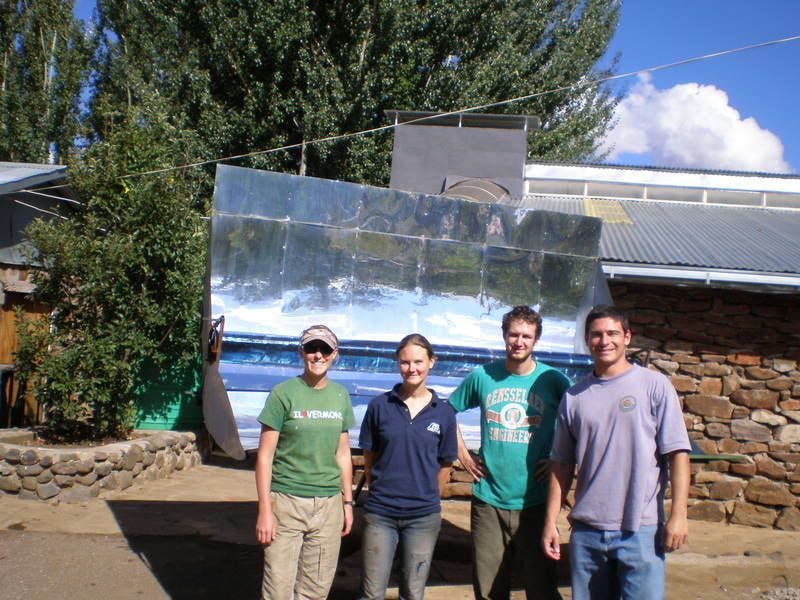
Me and the Solar Turbine Group in front of a solar oven. The cinnamon rolls that came out of this thing were really delicious.

Bethel Church
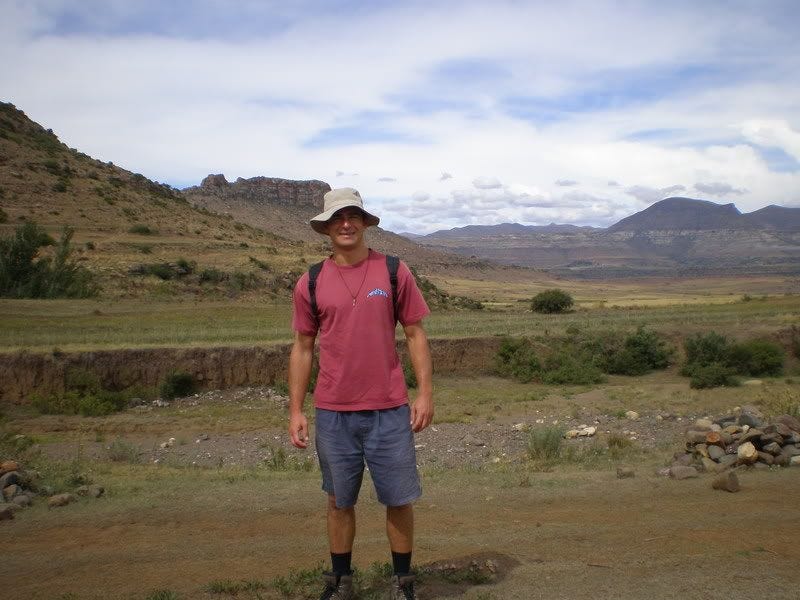
While waiting for the sunshine, I did some hiking and exploring.

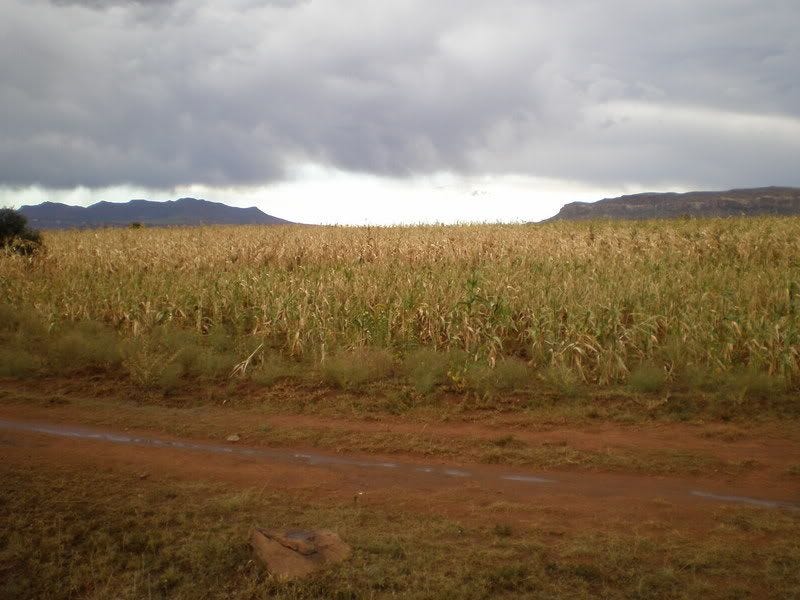
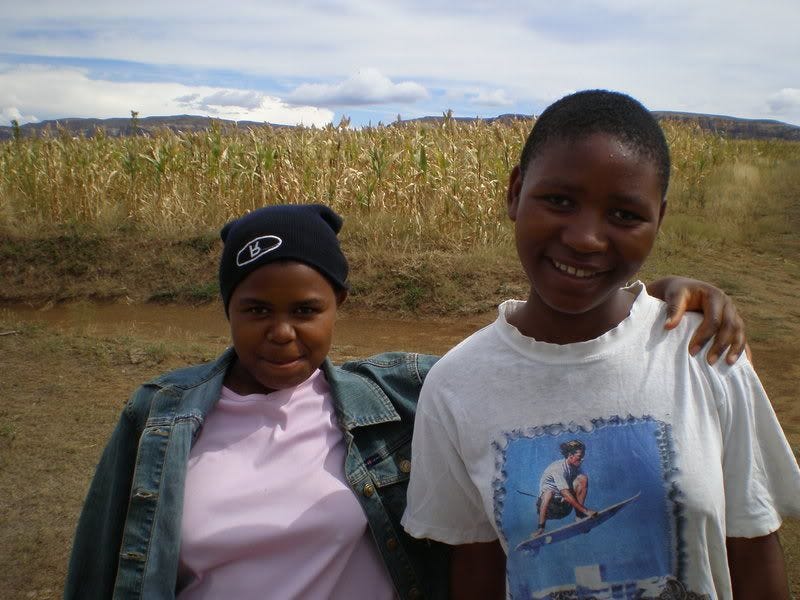
I met some people
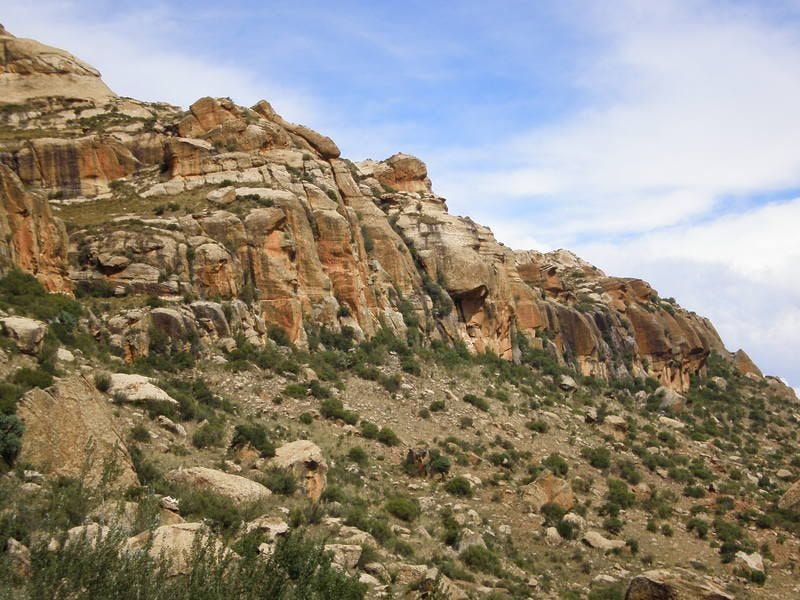
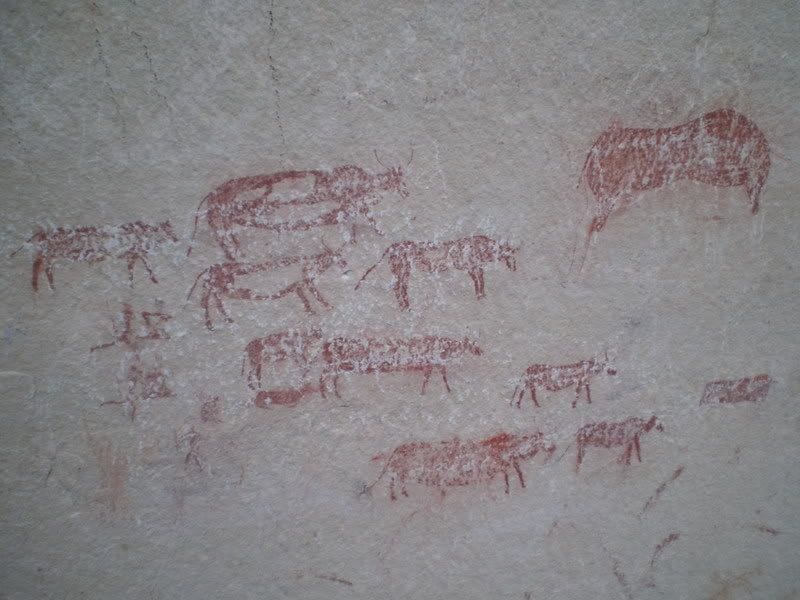
I saw some ancient San bushman art
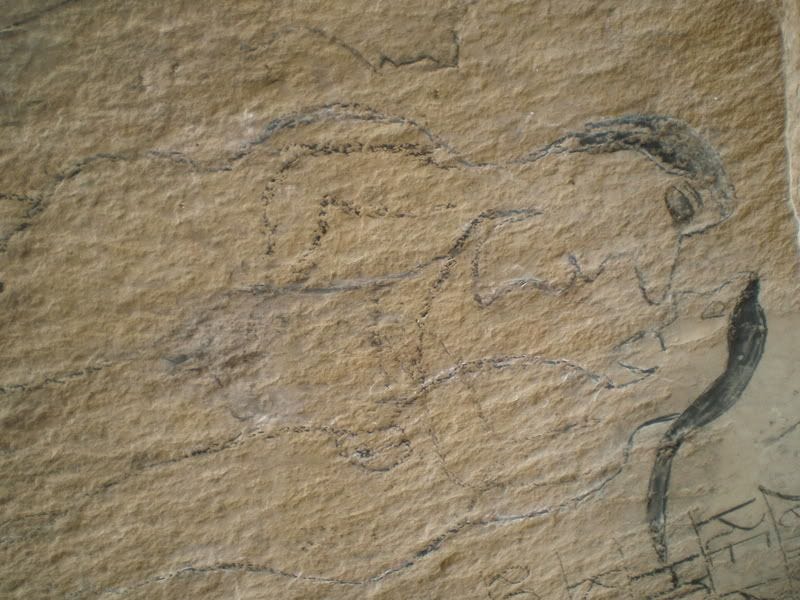
And some modern art
My experiences trying to get out of Bethel, Lesotho should illustrate why this is such an important project:
Electrical cables haven’t yet reached this area. The nearest paved road is either: Option A: 4 hours driving along a really bad dirt road or Option B: 30 minute boat rip across a river plus a 30 minute taxi ride on another bad road. I took Option A on the way in so I figured I’d go for Option B on the way out, plus it seemed shorter. Big Mistake. They piled so many people on this dinky rowboat that it started sinking halfway across the river. My backpack and half the passengers were completely submerged. I was holding my video camera over my head so that it would at least remain dry. We paddled back to the original side, which I couldn’t comprehend since we were already halfway across. We unloaded half the passengers, dumped out all the water, and tried again. This time there was just a small thumb-sized puncture in the boat that spouted a refreshing fountain of water on all the passengers. We made it across and I thought I was lucky that I was not amongst the passengers who were unloaded, because now I would get on the first minibus out. Wrong Again. In Africa, public transport doesn’t leave until its full of full sized humans, chickens, screaming babies, and/or grains. So we waited for the boat to go back to the other side, pick up more people, return, go back to the other side, pick up some screaming babies, and then return. The whole ordeal took hours. In the meantime, a girl asked me to be her pen pal and I realized I still had a box of Passover matzoh that I picked up in Joburg to snack on, so I shared it with my new friends. They actually loved it, or at least pretended to. Finally, there were enough bodies to fill up the entire bed of the pickup truck and we were on our way.
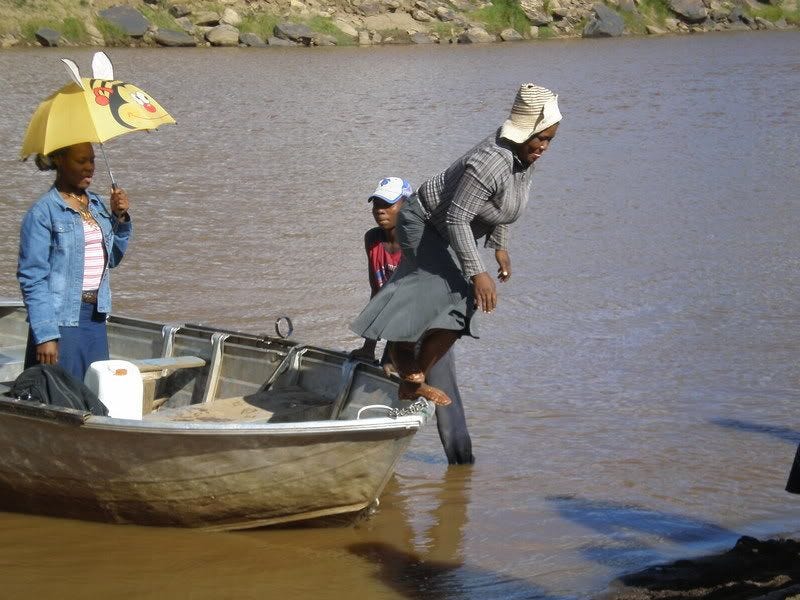

I wasn't the only one excited to get off the boat
This is the scene just before I got on the doomed rowboat.
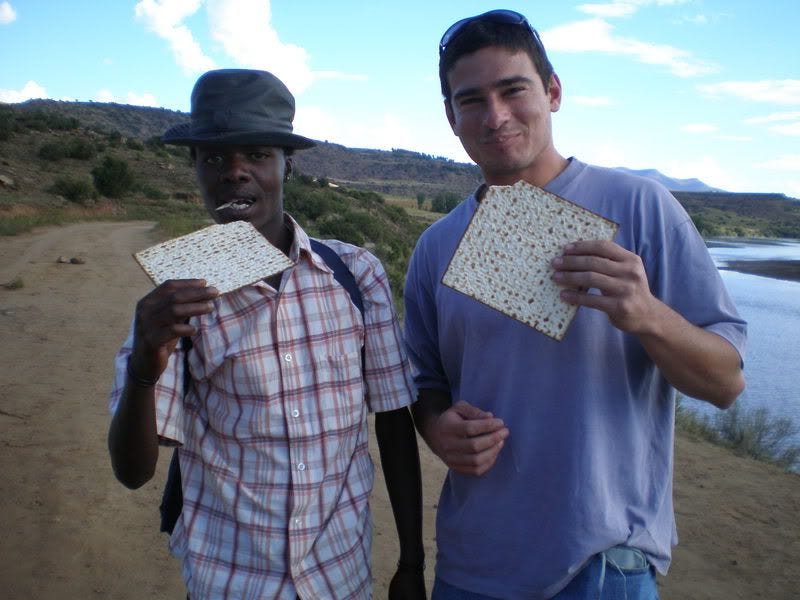
Matzoh Party Lesotho Style
We got to the small town of Mount Morosi, where I transferred to another bus, which, after filling up completely, took me to the medium sized town of Quthing. An hour later I got on another bus, which after filling up completely, took me in the direction of the capital city, Maseru. I heard that there was an express bus and a commuter bus so I wanted to make sure I got on the express bus. I asked the driver if we went straight to Maseru and he said “yes.” To make sure he understood the question and wasn’t just saying the only word he knew in English, I rephrased the question: Do we stop or do we go straight to Maseru? He said, “Straight, straight to Maseru.” I realized after a few minutes that the driver lied to me. I was on the commuter bus, which stopped every kilometer to pick up and drop off passengers. I sat in the front seat, right next to the driver, and every time we stopped I just looked at him and smiled at the chutzpah that he would lie to me knowing he was going to be caught out in the lie minutes later. He was a really bad driver who couldn’t seem to drive straight while typing SMS’s. He also blasted heavy bass techno to the point that the car was shaking and the speaker was conveniently located right above my head. Night fell and I wasn’t even half way to Maseru.
Just as I was drifting to sleep in my new travel pillow that I bought just for such torturous African transportation, I saw a pedestrian in the road ahead of us. Our driver was looking at his cell phone at the time and we nailed the guy just as I finished screaming “Careful!!” There was a loud bang of a bumper hitting bones. We were going at least 100 kilometers per hour and the dude flew about 10 meters to the side of the car. I ran out of the bus wondering if I would give first aid in the most AIDS ridden region of the world. Miraculously, by the time I reached him the dude had gotten off the floor and continued walking as if nothing had happened. Meanwhile our front bumper was loose and our side mirror had been knocked off. We spent a half hour looking for the mirror near the scene of the accident. We found the mirror and we finally made it to Maseru, I at 9 at night.
I ate some burnt corn and then took another minibus from Maseru to the South African border. I crossed through the Lesotho side easily. There was not a single soul on line. I greeted the official, “Hotso” (Sotho for Peace). He said I must come back soon to Lesotho, wished me a good trip, and stamped my passport. Just as I was thinking my luck was changing, I saw a scene I’ll never forget. Thousands upon thousands of people lined up at the South African border, a huddled mass of humanity, camouflaged by the blackness of night. I realized my mistake immediately. Most of Lesotho’s workforce actually works in South Africa due to the job shortage in Lesotho. I was crossing from Lesotho to South Africa the Tuesday after Easter, when every migrant worker was heading back to work. I observed the line for about 10 minutes. It didn’t move an inch. I figured I had two options: Option A was to get in the back of the line and most likely wait about 48 hours to cross the border. Option B was to play the white card and try to finagle my way across the border. I went for Option B and just began walking towards South Africa. I walked to the gate with an African on my right and left. Officials stopped them both while I walked straight through. Nobody stopped me, said anything, or stamped my passport. I was in South Africa.
Then when I saw the lines for taxis to Johannesburg I realized the hardships these workers face. It was even longer than the line at the border. These people must wait days until they can get back to work. I decided I would hitchhike and at the very least just sleep on the side of the road. I figured there was no point even waiting in these lines that don’t move. So I stuck my thumb out and within 30 seconds a 6-wheel truck stopped and offered me a lift. Abraham and Daniel were their “Christian” names. They were two employees of a furniture company in Lesotho doing their weekly supply run to pick up wood in Joburg. I sat in between them in the front of the rig and we made small talk the entire five-hour trip to Joburg. They were great guys. I bought them beers and gave them a small tip after we made it in to Soweto at 2 AM. From there I took a cab to and made it to the Northern Suburbs of Johannesburg at 3AM. I had made it out of Africa.

